In today’s food landscape, the consumer is no longer passive. They are informed, label-conscious, and increasingly demanding of transparency and quality. For dairy brands, this shift has redefined what it means to be a “trusted” name. Trust is earned not just through claims but through meticulous processes—rigorous, multi-layered testing ecosystems designed to meet even the most discerning expectations.
Dairy is a daily essential and occupies a central place in everyday nutrition. This means that any compromise in quality can have long-term health implications. In this market, only brands with an uncompromising commitment to product integrity can survive and, eventually, thrive.
Microbiological Testing: Safety First
The first line of assurance begins with microbiological testing. Every batch of milk, yogurt, cream cheese and paneer undergoes total plate count (TPC) testing to measure microbial load. Products are also tested rigorously for pathogens such as E. coli, Listeria monocytogenes, Salmonella and Staphylococcus aureus, especially in ready-to-eat products including yogurt and cream cheese.
For probiotic yogurts, V-Rich goes one step further by measuring the count of beneficial bacteria such as Lactobacillus acidophilus and Bifidobacterium bifidum. This ensures that we don’t just promise health benefits—we deliver them, right down to the colony-forming units (CFU) per gram.
Chemical Testing: No Additives, No Compromise
Today, “clean-label” is not a marketing term. Our commitment is validated through meticulous chemical testing. V- Rich is amongst the very few brands in dairy where each product and every batch is carefully tested for the presence of common dairy adulterants such as urea, starch, detergent and hydrogen peroxide, the use of which is unfortunately still prevalent in parts of the unregulated supply chain. Additionally, we test for preservatives, thickeners, stabilizers and emulsifiers through batch-wise chemical screening that can be shared transparently with partners and regulators alike.
Nutritional Testing: Transparency You Can Trust
Modern consumers don’t just want to know if a product is safe. They want to know if it’s nutritionally beneficial too. That’s why nutritional profiling is essential.
Brands may test each SKU for:
- Protein content (especially critical in paneer and yogurt)
- Fat content (to clearly define full cream vs. toned milk)
- Calcium and micronutrients
- Added sugar vs. natural sugar levels in flavoured or probiotic variants
- pH and acidity to validate freshness and fermentation integrity
All of these parameters are then clearly presented on the packaging.
Sensory Testing: The Human Touch
Beyond lab values, great dairy must also delight. The sensory testing protocols include blind taste testing conducted with chefs, nutritionists and real customers. Texture, aroma, taste, and mouthfeel are rated and benchmarked against both internal standards and market leaders. Teams use this feedback to fine-tune formulations without relying on artificial enhancers. Whether it’s the silky texture of cream cheese or the tangy richness of probiotic yogurt, every batch is built for both performance and pleasure. We are subjected to elevated stress conditions to monitor microbial and chemical stability, a practice not commonly adopted by all clean label brands.
The Way Forward
As India steps into a new era of food awareness, the role of testing will only grow in importance. It is not a regulatory necessity — it is a moral responsibility and a brand differentiator. With clean-label expectations rising globally, brands must ensure their purity claims are backed by science.
About the Author:
Yogitha Jahnavi, Founder & CEO of V-Rich



